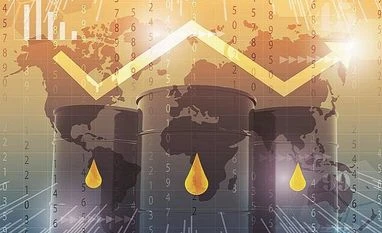Oil prices extended gains Monday as rising US-Iran tensions fuelled supply concerns, while Asian equity traders moved cautiously ahead of a crunch meeting between Donald Trump and Xi Jinping this week.
Both main crude contracts are up almost 10 per cent since Tehran last week shot down a US "spy drone" for breaching its airspace, ratcheting up fears of a conflict between the old foes.
At the weekend Trump said he would impose fresh sanctions on Iran, following bans of countries buying its oil, while US media reports said Washington secretly launched cyber-attacks against missile control systems and a spy network.
Both sides say they want to avoid war, but tensions have spiralled as a series of incidents, including the drone downing and recent attacks on tankers, raised fears of an unintended slide towards conflict.
The US president said he was ready to reach out to Iran if it renounced nuclear weapons, adding that if leaders did so "I'm going to be their best friend".
But Iran continues to insist its atomic programme is for civilian purposes.
More From This Section
Brent rose 0.3 per cent Monday and WTI was 0.5 per cent higher.
"The geopolitical escalation in the Middle East is unquestionably a bullish short-term signal for oil markets, as even the thought of 20 per cent of the world oil supply being affected is enough to trigger significant tremors," said Stephen Innes, managing partner at Vanguard Markets.
"And these tremors are noticeably moving up the Richter scale."
The stand-off, coupled with a weak dollar as the Federal Reserve flags an interest rate cut, has helped push gold prices to six-year highs above $1,400 as dealers look for a safe haven to park their cash.
Still, share markets remain buoyant on hopes Trump and Xi can break an impasse in their trade war when they meet on the sidelines of the G20 summit in Osaka this week.
Global equities have been rallying since Trump hailed positive telephone talks last week and said the two would have a face-to-face in Japan, fuelling hopes of a possible end to their long-running tariffs battle.
In morning trade Hong Kong was up 0.4 per cent, while Shanghai added 0.2 per cent and Tokyo went into the break 0.1 per cent higher.
Seoul, Wellington and Manila added 0.2 per cent each, though Sydney, Singapore, Taipei and Jakarta were in the red.
The dollar continues to face pressure from bets the Fed will lower borrowing costs as soon as July as it looks to head off the effects of the trade spat and as the US economy shows signs of softening.
The greenback slipped against its major peers and most high-yielding units, with the Australian dollar and South Korean won 0.4 per cent higher.
The Turkish lira jumped 0.8 per cent after the opposition candidate in Istanbul's controversial mayoral election re-run again beat President Recep Tayyip Erdogan's ruling party.
Bitcoin continued to rise, breaking the $11,000 mark briefly for the first time since March last year, as the cryptocurrency sector gets a huge boost from Facebook's unveiling of its own unit.
The tech titan said it will launch Libra next year, with the backing by a basket of real-world currencies and a consortium of companies including Visa, MasterCard, PayPal and Uber.
"Libra will now have to deal with a ton of regulatory scrutiny, but that won't matter in the bigger picture for crypto traders of other coins," said OANDA senior market analyst Edward Moya.
"Bitcoin volatility is likely to persist, with $12,000 and $15,000 as the next two critical resistance levels."
Bitcoin has risen about 20 per cent this month alone but is still well off the record levels near $20,000 seen at the end of 2017.
)